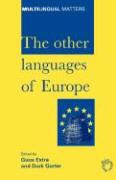Read more
The book offers demographic, sociolinguistic, and educational perspectives on the status of both regional and immigrant languages in Europe and in a wider international context. From a cross-national point of view, empirical evidence on the status of these other languages of multicultural Europe is brought together in a combined frame of reference.
List of contents
Part I Regional language in Europe: Basque in Spain and France, J. Cenoz; Welsh in Great Britain, C. Williams; Scottish Gaelic in Great Britain, B. Robertson; Frisian in the Netherlands, D. Gorter, A. Riermersma and J. Ytsma; Slovenian in Austria with a focus on Charinthia, B. Busch; Swedish in Finland A-L Ostern; national minority languages in Sweden, L. Huss. Part II Immigrant languages in Europe: Immigrant languages in Sweden, S. Boyd; immigrant languages in Germany, with a focus on Hamburg and Hessen, I. Gogolin and H. Reich; immigrant languages in the Netherlands, T. van der Avoird, P. Broeder and G. Extra; community languages in Great Britain, V. Edwards and E. Reid; immigrant language in France, D. Caubet and G. Vermes; Arabic in Spain, B. Lopez Garcia and L. Mijares Molina; Roma in Europe, P. Bakker. Part III Outlook from abroad: multingualism and multiculturalism in Canada, J. Edwards; Spanish in the USA, with a foucs on California, R. Macias; majority and minority languages in South Africa, N. Alexander; immigration and language policy in Australia, U. Ozolins and M. Clyne; linguistic minorities in India, A. Choudhry; languages in Turkey, K. Yamur; languages in Morocco, J. Saib.
About the author
Guus Extra is director of Babylon, Center for Studies of Multilingualism in the Multicultural Society at Tilburg University (the Netherlands) and professor of language and minorities at the same university.; Durk Gorter is head of the Department of Social Sciences at the Fryske Akademy in Ljouwert/Leeuwarden (the Netherlands) and professor of Frisian sociolinguistics at the University of Amsterdam.

